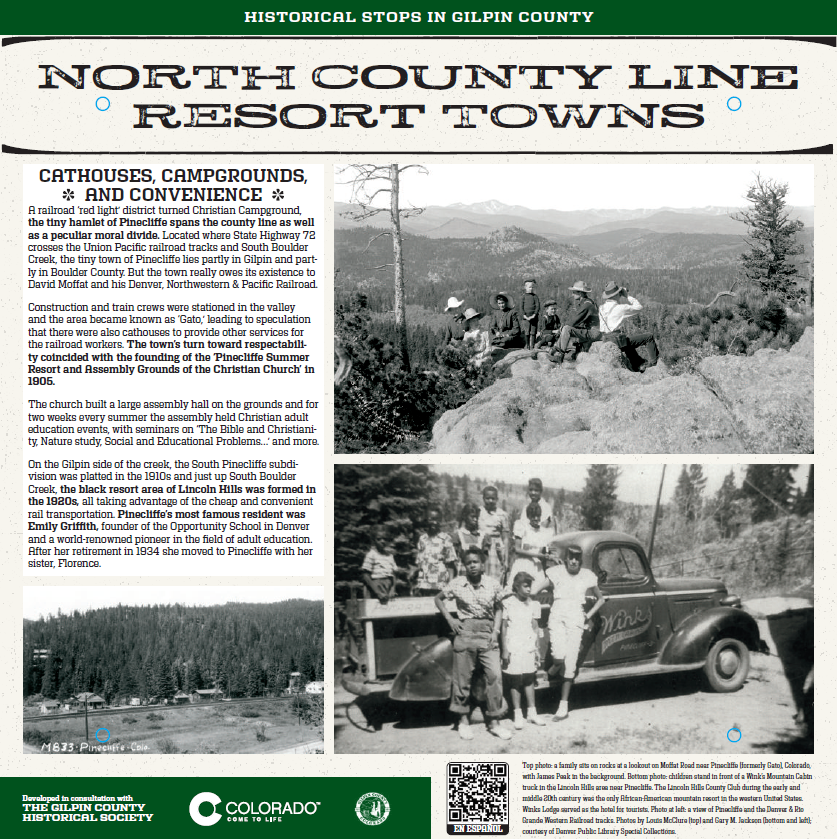Resort Towns
North County Line - Resort Towns of North Gilpin – Pinecliffe and Lincoln Hills
Information printed with permission of the Gilpin County Historical Society, originally published in Alan Granruth’s “The Little Kingdom of Gilpin – Gilpin County, Colorado”
Location: Highway 119, southbound, near mile marker 22
“A railroad ‘red light’ district turned Christian Campground, the tiny hamlet of Pinecliffe spans the county line as well as a peculiar moral divide. Located where SH 72 crosses the Union Pacific railroad tracks and South Boulder Creek, the tiny town of Pinecliffe lies partly in Gilpin and partly in Boulder County. But the town really owes its existence to David Moffat and his Denver, Northwestern & Pacific Railroad.
Construction and train crews were stationed in the valley and the area became known as ‘Gato,’ leading to speculation that there were also cathouses to provide other services for the railroad workers. The town’s turn toward respectability coincided with the founding of the ‘Pinecliffe Summer Resort and Assembly Grounds of the Christian Church’ in 1905.
The church built a large assembly hall on the grounds and for two weeks every summer the assembly held Christian adult education events, with seminars on ‘The Bible and Christianity, Nature study, Social and Educational Problems…’ and more.
On the Gilpin side of the creek, the South Pinecliffe subdivision was platted in the 1910s and just up South Boulder Creek, the black resort area of Lincoln Hills was formed in the 1920s, all taking advantage of the cheap and convenient rail transportation. Pinecliffe’s most famous resident was Emily Griffith, founder of the Opportunity School in Denver and a world-renowned pioneer in the field of adult education. After her retirement in 1934 she moved to Pinecliffe with her sister, Florence.”

Línea del Condado Norte - Pueblos Turísticos del Norte de Gilpin - Pinecliffe y Lincoln Hills
Ubicación: Carretera 119, dirección sur, cerca del marcador de milla 22.
Un distrito ferroviario de "luz roja" que se convirtió en un campamento cristiano, la pequeña aldea de Pinecliffe abarca la línea del condado, así como una peculiar división moral. Ubicado donde la carretera SH 72 cruza las vías del ferrocarril Union Pacific y el arroyo South Boulder, el pequeño pueblo de Pinecliffe está situado en parte en el condado de Gilpin y en parte en el condado de Boulder. Pero la existencia del pueblo realmente se debe a David Moffat y su Ferrocarril de Denver, Northwestern & Pacific.
La construcción y las tripulaciones de tren estaban estacionadas en el valle, y el área se hizo conocida como 'Gato', lo que llevó a especular que también había burdeles (o ‘cathouses’) para ofrecer otros servicios a los trabajadores del ferrocarril. El giro hacia la respetabilidad del pueblo coincidió con la fundación del 'Pinecliffe Summer Resort and Assembly Grounds of the Christian Church' en 1905.
La iglesia construyó un gran salón de asambleas en los terrenos y durante dos semanas cada verano, la asamblea celebraba eventos de educación cristiana para adultos, con seminarios sobre 'La Biblia y el Cristianismo, el Estudio de la Naturaleza, los Problemas Sociales y Educativos...' y más.
En el lado del arroyo en Gilpin, la subdivisión de South Pinecliffe fue trazada en la década de 1910 y justo arriba del arroyo South Boulder, se formó el área de complejos turísticos por y para afroamericanos conocido como Lincoln Hills en la década de 1920, aprovechando el transporte ferroviario barato y conveniente. La residente más famosa de Pinecliffe fue Emily Griffith, fundadora de la Opportunity School en Denver y pionera de renombre mundial en el campo de la educación para adultos. Después de su jubilación en 1934, se mudó a Pinecliffe con su hermana, Florence.
